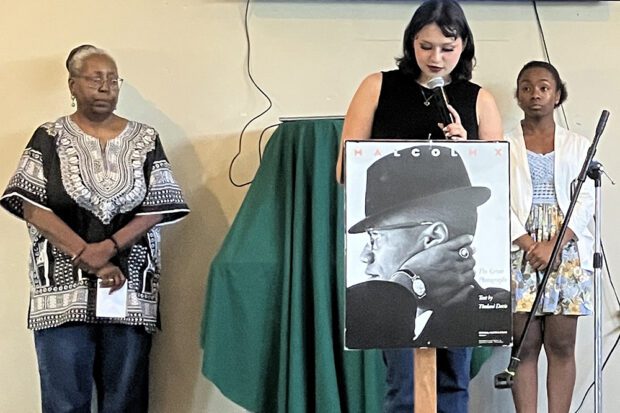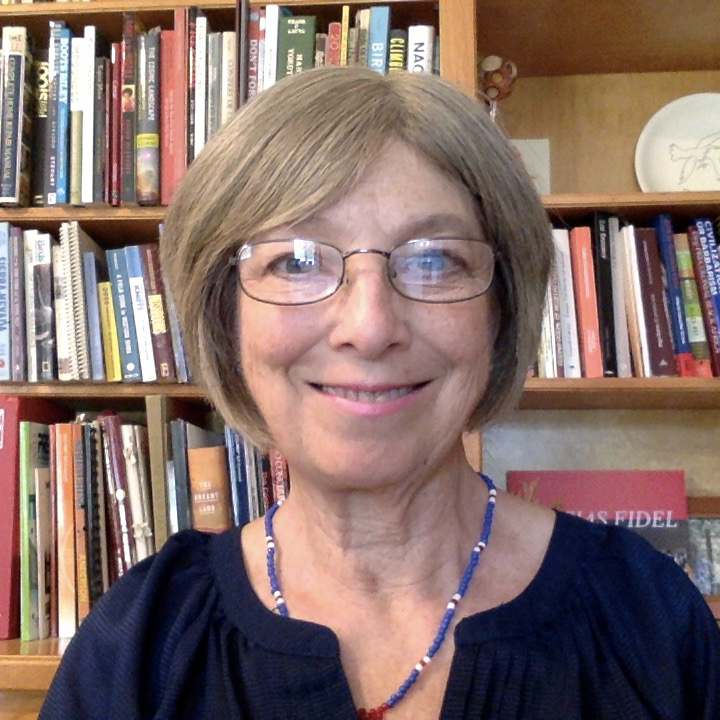
The third annual Malcolm X El-Hajj Malik El Shabazz birthday event on May 18 at Free AME Ministries featured young poets Alani Kent and Love Quezada, speakers Dr. Melissa Knight and Dr. Michael Onyebuchi Eze, African dance with Tara Dixson, and organizers and activists from the local community, including Aline Reed, Rev. Floyd Harris, Rafael Avitia and Hajj Reza Nekumanesh.
Following the Black national anthem and an introduction by Rev. Harris on the tradition of Black nationalism and the timely call to “Stand Up, Fight Back,” Kent shared her poem, “By Any Means: A Tribute to one of the Greats,” which starts as follows:
They feared his fire
Because his truth was flame
They twisted his words but still he spoke the name
Freedom.
Quezada’s poem, “His Flame,” included these key phrases:
The man transformed, his mind set free,
He gazed upon a greater sea,
Where unity could stand as one
The poem expressed the central concepts of the event: personal transformation and international solidarity.
“The future is secure,” stated organizer Reed as she awarded prizes to these amazing poets, both still in high school. In the first row, greeted respectfully by students, colleagues and community members, sat Dr. Kehinde Solwazi, professor emeritus, who led the huge task of creating African American studies at Fresno City College.
Dixson demonstrated African dance.
Nekumanesh then urged the participants to stand up in every aspect of their lives to emulate the insatiable and undying search for justice exemplified by Malcolm X.
Specifically, meeting just after the 77th anniversary of the Nakba and amid an ongoing genocide in Palestine, if one loves Malcolm X and his ideas, one must oppose this genocide.
Dr. Knight, an expert on empowering marginalized groups and healing individual trauma, spoke on how to release everything that no longer serves us, to be able to do the work that we must do.
Dr. Eze called his talk “When Lions Speak” and emphasized the importance of Black history and remembrance as responsibility, of mental decolonization and memory and narrative as survival. Black history is the unwritten epic of modern civilization.
He then spoke of Patrice Lumumba and the U.S. plot to have him killed, after giving a history of the Congo that spoke of little-known facts of African agency and resistance, as well as of the colonizers’ oppression and genocide.
This year, the event commemorated three anti-imperialist, anti-colonialist, revolutionary internationalist leaders born in 1925: Franz Fanon, Lumumba and Malcolm X. All were prophets and fully committed fighters for liberation. In their birthplaces, they united Africa with the African diaspora in the Caribbean and North America.
Fanon was a writer, philosopher and doctor from Martinique who was instrumental in raising the awareness of the connections of Afro-descendant people everywhere with each other and with Africa, raising feelings of pride and clarifying identity.
Before the lifting of consciousness and awareness sparked by his work and the freedom struggles in Africa and elsewhere, many people felt that identification with Africa was an insult.
Malcolm X, in a famous speech, talked about the harmful image of Africa that had been promoted for centuries, saying, “We looked upon Africa as a hateful place. We looked upon Africans as the hateful person. And if you referred to us as an African, it was like putting us as a servant.”
Fanon wrote that Black minds are distorted by “the white gaze”—the prevailing white viewpoint that is so all-present in media and government as to disappear as a viewpoint and become “reality.”
In World War II, Fanon fought on the side of the Free French, against the Nazis and their allies, but he was shocked by the anti-Blackness he encountered.
During the independence struggle of Algeria, he joined the Front de Libération Nationale (FLN). After the FLN’s victory, Malcolm X visited independent Algeria and saw that formerly colonized people had gained pride and respect through nationalism and revolution and the colonized and that historically former-enslaved people in the United States could do the same.
Although Malcolm X’s four-month-plus trip to Africa took place in 1964, after Fanon’s death from leukemia in 1961 and Lumumba’s assassination the same year, the connection he made to the international struggle could not be stopped.
Lumumba successfully led the independence struggle in the Congo. Lumumba’s determination to achieve genuine independence and to have full control over the Congo’s resources to use them to benefit the Congolese people was perceived as a threat to Western interests, as was his opposition to the South African racist colonial government.
Eisenhower ordered CIA Chief Allen Dulles to have him killed and, on Jan. 17, 1961, the Belgians carried out the actual killing after torturing him. Maurice Mpolo (Minister of Sports) and Joseph Okito (President of the Senate) were tortured and killed with him.
(In May 2021, more than 60 years later, Belgian officials announced that they would return the remains of Lumumba to his family: “The remains” was just a single tooth as his body was dissolved in acid following his assassination.)
As Fanon said in a chapter about Lumumba in his book Toward the African Revolution, “Hesitation in murder has never characterised imperialism.”
Lumumba highlighted the suffering of the indigenous population under European rule and refused the colonialist narrative as well as colonial rule. Lumumba included all Congolese people regardless of ethnicity and he offered a basis for national identity based on survival of colonial victimization, as well as the people’s innate dignity, humanity, strength and unity.
Lumumba’s ideal of humanism included the values of egalitarianism, social justice, liberty and the recognition of fundamental rights. He saw the state as a tool for the public welfare, necessary to ensure equality, justice and social harmony. That was what the colonial powers, including the United States, could not tolerate.
“The day will come when history will speak. But it will not be the history which will be taught in Brussels, Paris, Washington or the United Nations…Africa will write its own history and in both north and south it will be a history of glory and dignity,” said Lumumba.
Malcolm X was assassinated on Feb. 21, 1965. One month before he was killed, he said, “we are today seeing a global rebellion of the oppressed against the oppressor, the exploited against the exploiter.” That rebellion continues and his words are more true than ever: “We want freedom by any means necessary. We want justice by any means necessary. We want equality by any means necessary.”

